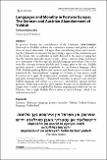Files in this item
Languages and morality in postwar Europe : the German and Austrian abandonment of Yiddish
Item metadata
| dc.contributor.author | Kamusella, Tomasz | |
| dc.date.accessioned | 2023-01-09T15:30:11Z | |
| dc.date.available | 2023-01-09T15:30:11Z | |
| dc.date.issued | 2022-12-05 | |
| dc.identifier | 282540498 | |
| dc.identifier | 62456508-b458-4177-8210-9f3fae3211a3 | |
| dc.identifier | 85143988774 | |
| dc.identifier.citation | Kamusella , T 2022 , ' Languages and morality in postwar Europe : the German and Austrian abandonment of Yiddish ' , Journal of Nationalism, Memory and Language Politics , vol. 16 , no. 2 , pp. 172 - 193 . https://doi.org/10.2478/jnmlp-2022-0010 | en |
| dc.identifier.issn | 2570-5857 | |
| dc.identifier.other | ORCID: /0000-0003-3484-8352/work/124889195 | |
| dc.identifier.uri | https://hdl.handle.net/10023/26722 | |
| dc.description.abstract | In postwar Europe the remembrance of the Holocaust (קאַטאַסטראָפע Katastrofe in Yiddish) endows the continent’s societies and politics with a clear-cut moral dimension. All agree that remembering about and researching the Holocaust is necessary for preventing a repeat of the murderous past in the future. Yet, no reflection is really devoted to the most revealing fact that the wartime genocide’s main victims – Jews – exist no longer in Europe as a community with their specific Yiddish language and culture. Due to the twin-like closeness between Yiddish and German, prior to the war, Yiddish speakers ensured a world-wide popularity for the German language. After 1945, Yiddish-speaking Holocaust survivors and Jewish poets exorcised and reinvented the then-murderers’ language of German, so that poetry could be written in it again. In reciprocation, Germany and Europe – shockingly and quite incomprehensibly – abandoned their duty to preserve and cultivate Yiddish language and culture as a necessary “inoculation” against another genocide. Forgetting about this duty imperils Europe and its inhabitants; the danger now is sadly exemplified by Russia’s ongoing genocidal-scale war on Ukraine. Not a single Yiddish library exists in today’s Europe, which is an indictment in itself. | |
| dc.format.extent | 22 | |
| dc.format.extent | 336701 | |
| dc.language.iso | eng | |
| dc.relation.ispartof | Journal of Nationalism, Memory and Language Politics | en |
| dc.subject | Yiddish | en |
| dc.subject | Europe | en |
| dc.subject | Germany | en |
| dc.subject | German | en |
| dc.subject | Yiddish-German language | en |
| dc.subject | Yiddishland | en |
| dc.subject | Holocaust | en |
| dc.subject | Katastrofe | en |
| dc.subject | Shoah | en |
| dc.subject | Antisemitism | en |
| dc.subject | JN Political institutions (Europe) | en |
| dc.subject | PD Germanic languages | en |
| dc.subject | History | en |
| dc.subject | Cultural Studies | en |
| dc.subject | Linguistics and Language | en |
| dc.subject | Sociology and Political Science | en |
| dc.subject | T-NDAS | en |
| dc.subject | SDG 16 - Peace, Justice and Strong Institutions | en |
| dc.subject | MCC | en |
| dc.subject.lcc | JN | en |
| dc.subject.lcc | PD | en |
| dc.title | Languages and morality in postwar Europe : the German and Austrian abandonment of Yiddish | en |
| dc.type | Journal article | en |
| dc.contributor.institution | University of St Andrews. St Andrews Institute for Transnational & Spatial History | en |
| dc.contributor.institution | University of St Andrews. School of History | en |
| dc.identifier.doi | https://doi.org/10.2478/jnmlp-2022-0010 | |
| dc.description.status | Peer reviewed | en |
This item appears in the following Collection(s)
Items in the St Andrews Research Repository are protected by copyright, with all rights reserved, unless otherwise indicated.

